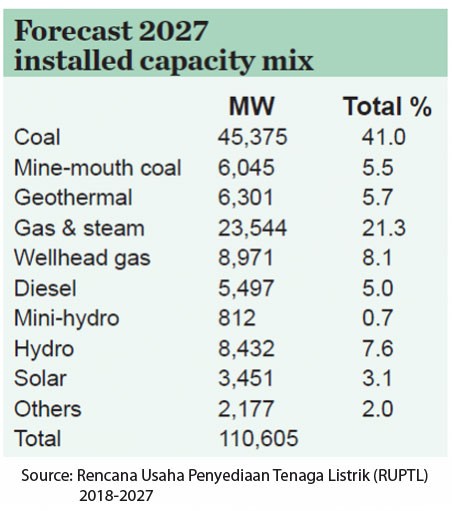Popular Reads
Top Results
Can't find what you're looking for?
View all search resultsPopular Reads
Top Results
Can't find what you're looking for?
View all search resultsOne notorious rule scares away investors
Wind-wind solution: A windmill farm project is under way in Sidrap, South Sulawesi
Change text size
Gift Premium Articles
to Anyone
W
ind-wind solution: A windmill farm project is under way in Sidrap, South Sulawesi. The 75-megawatt power plant will help southern and western Sulawesi meet their rising demand for electricity. (Antara/Abriawan Abhe)
At first, Andri Doni was supportive of the state policy on renewable energy pricing, which he believed would help fire up the volatile business. But his hopes were soon dashed, and he felt cheated at best.
Andri, deputy chairman of the Indonesian Electrical Society (MKI), was one of several businesspeople the Energy and Mineral Resources Ministry invited in January last year to contribute their ideas to drafting a new regulation on renewable energy development.
The draft law’s most contentious issue was the government plan to cap the solar tariff at 85 percent of the regional electricity supply cost (BPP) if it exceeded the national average. The proposal met strong opposition from the group, but Andri appeared to be supportive, believing that most of the solar panels would be installed in eastern regions that imposed relatively high BPPs and, therefore, would still yield reasonable profits.
To his dismay, just four days after the meeting, the ministry issued Regulation No. 12/2017 that set the 85 percent tariff for all renewable power.
“What on Earth was that about? We talked only about solar electricity then,” said Andri.
Resentment also came from Association of Hydroelectric Power Plant Developers (APPLTA) chairman Riza Husni. He also contributed his ideas to the ministry, which planned to eventually revise the unpopular regulation in July.
That month, he recalled, Energy and Mineral Resources deputy minister Arcandra Tahar asked the businessmen to pool ideas to revise the existing regulation they had railed against, promising a better policy on renewable energy. A fortnight on, the ministry issued the revised policy as Regulation No. 50/2017.
“But frankly, [the revised regulation] is worse than the old version,” said Riza.
Interestingly, not every bureaucrat at the ministry is happy about the new regulation either, which was supposed to improve the business climate. For one, the ministry’s renewable energy director general, Rida Mulyana, has said that the revised regulation was actually so bad it hampered investment in Indonesia’s renewable sector.
Rida said investors had told him that they were stuck in a wait-and-see mode. The ramifications were immediately apparent: Investment in the renewable energy sector topped at Rp 18 trillion (US$1.3 billion) in 2017, below the government’s target of Rp 21 trillion.
More downsides are underlined in a policy paper the Office of the Coordinating Economic Minister issued in November that reviews the enforcement of Regulation No. 50/2017 and its impacts on the renewable energy sector.
The paper notes that the stipulations on tariffs have particularly discouraged investors from investing in Indonesia’s renewable energy business. It criticizes the pricing policy that was based primarily on how to make renewable electricity affordable but disregarded other advantages.
“PLN continues to prioritize fossil fuel power plants without considering their externalities. Consequently, renewable power plants, which emit less greenhouse gases and incur lower or zero externalities, have not received fair consideration,” the paper states.
On the brighter side, the regulation allows business-to-business negotiations between PLN and independent developers over electricity tariffs from wind, solar, biomass, biogas and marine power plants in regions where electricity supply costs are set below that of the national average.
However, in the eyes of some developers, PLN is not always trustworthy. They allege that the state company often sets different tariffs for different regions for unclear reasons.

For instance, the price of electricity that is produced by the 4-megawatt (MW) Batunobota I mini-hydro power plant in Tolitoli, Central Sulawesi, has been set at Rp 1,320 per kilowatt hour (kWh), or 65 percent of the BPP.
But PLN pegged the tariff for the 5-MW Totabuan I in North Sulawesi at Rp 1,254 per kWh, 75 percent of the BPP.
Another disputed clause in the regulation is one that requires investors to transfer their renewable power plants to the PLN at the end of their contracts for $1,000.
The confusing policy has met resistance from investors. For instance, plantation company PT Austindo Nusantara Jaya, which operates a 1.8 MW biogas-fueled power plant in Belitung, has shelved a plan to develop three other facilities in its plantation areas because it rejects the legal obligation of transferring them to PLN after 30 years.
“We want to build biogas plants on our own property. They will be fueled with palm oil waste from our mills, so how can they force us to transfer [the plants] to PLN?” said the firm’s renewable energy development head, Imam Wahyudi.
Despite the opposition, Energy and Mineral Resources Minister Ignasius Jonan has made it clear he will not back down on Regulation No. 50/2017. He believes there are many investors out there that were willing to invest in the renewable energy sector under the current regulation.
To the contrary, the no-nonsense minister advised that would-be investors take into account the weak purchasing power of most people, instead of just their own production costs.
“Electricity should be available at affordable prices […] If big profit is what [investors] are after, they should better be currency traders or bond traders, not independent power producers.” he said.










